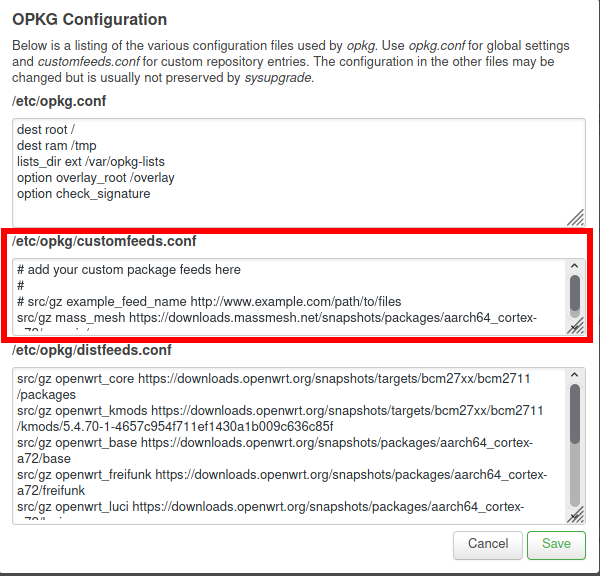Difference between revisions of "LuCI Hacking"
Jump to navigation
Jump to search
(Add instructions for custom feeds) |
(Add link to "de-bricking guide") |
||
| Line 1: | Line 1: | ||
LuCI is the front-end interface of OpenWrt, and is used to administer each of the routers (mesh nodes) on our network. Development resources for this software are fairly scattered, so please drop them here when you find them. | LuCI is the front-end interface of OpenWrt, and is used to administer each of the routers (mesh nodes) on our network. Development resources for this software are fairly scattered, so please drop them here when you find them. | ||
| + | |||
| + | {{Warning| If you have "bricked" your device, have no fear! Read the [https://openwrt.org/docs/guide-user/troubleshooting/generic.debrick OpenWrt de-bricking guide] before doing anything rash.}} | ||
= External Resources = | = External Resources = | ||
Revision as of 15:11, 25 October 2020
LuCI is the front-end interface of OpenWrt, and is used to administer each of the routers (mesh nodes) on our network. Development resources for this software are fairly scattered, so please drop them here when you find them.
Warning: If you have "bricked" your device, have no fear! Read the OpenWrt de-bricking guide before doing anything rash.
External Resources
Adding a Package Feed
To add a package feed, navigate to System > Software > Configure opkg. Place your package feed(s) in the box highlighted below. For more information about custom feeds, see the OpenWrt wiki.
Note: The Mass Mesh package feeds for Raspberry Pi 4b are hosted at https://downloads.massmesh.net/snapshots/packages/aarch64_cortex-a72/generic/
